This post may contain affiliate links. For more info, please read our full disclosure here
One of the most popular questions a lot of people ask about meatless diets is, “so where do I get all my protein from?” And that’s a pretty good question.
Plant-based diets like vegetarian and vegan diets involve the exclusion of most or all animal products, such as meat, cheese, bacon, eggs and so on.
And while this lifestyle comes with a good number of benefits, both environmental and health-wise, one common concern is whether or not it’s possible to still get enough protein in your daily meals.
Well, to answer that question, of course it’s very possible.
Even with animal-based sources out of the way, there are still lots of good plant-based protein sources for you to enjoy.
In this post, you’ll discover 10 of the best high-protein plant-based foods you can enjoy on a vegetarian or vegan diet.
Let’s dive in.
Why Protein Is Important
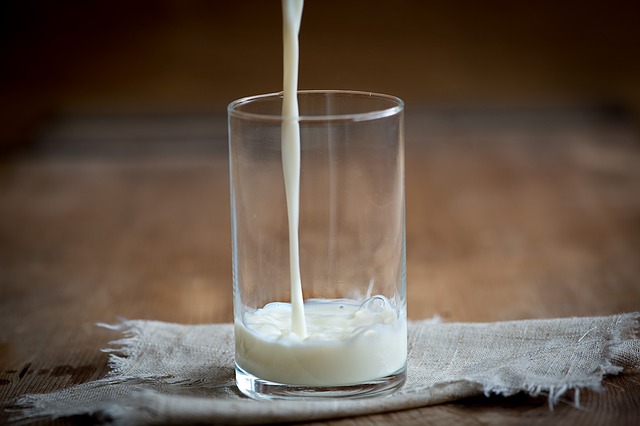
Protein, just like the rest of the macronutrients (fats and carbohydrates), are part of the building blocks of life. Majority of our bodily functions alone are made possible because of them.
From cell building and maintenance, to muscle growth, proper immune function, transport of nutrients and much more. Therefore, it is important to maintain a healthy and balanced diet that includes the right proportions of these required nutrients.
The importance of a proper protein intake can never be overemphasized. Some benefits associated with a protein-rich diet include;
- Aids healthy muscle growth, recovery and development
- Reduced hunger cravings and increased satiety (feeling of fullness)
- Promotes healthy metabolism
- Helps to boost immune function and much more
So that raises the next question: How much should we be eating per day?
How Much Protein Should You Be Eating?
Like I said earlier, getting the right amount of your required nutrients is an important part of healthy living.
When it comes to your required protein intake, there is no one size fits all value. The amount of protein your body requires per day for example, depends on a number of factors.
These include;
- Your age
- Weight/BMI
- Activity levels
- Fitness goals (if any)
- Existing medical conditions (in some special cases)
According to the Dietary Reference Intake, it is often recommended for adults to consume about 0.8g of protein per kg of body weight, or about 0.36 g per pound.
Putting that into perspective, let’s say someone weighs 135 lbs. (61 kg). Following the RDI, it means they’ll need to consume about 49g of protein per day.
But like I said earlier, this value can fluctuate a bit, depending on some of the factors stated above. A good way to determine your individual protein needs is by putting the different factors into consideration.
Resources like this Protein Calculator, and this in-depth guide to calculating your protein intake, can help you figure things out more accurately.
10 Plant-Based Protein Food Sources
Now that you understand it’s importance and how much to eat, the next step is determining the best plant-based protein food sources to enjoy in your meals.
These 10 plant-based food sources are not only rich in protein, but also in other essential nutrients as well.
1) Seitan
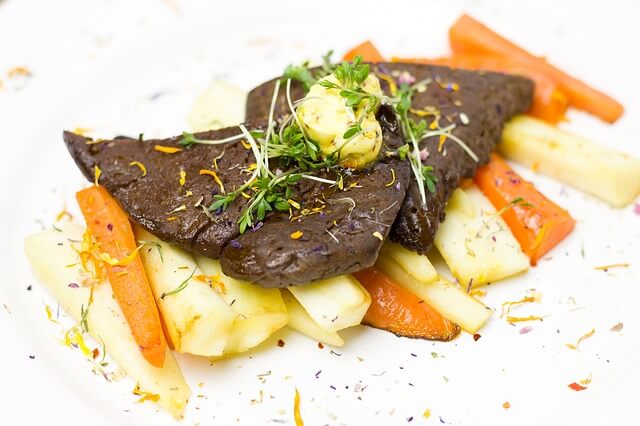
When it comes to the top plant-based protein sources, there’s no ignoring seitan, A.K.A wheat protein or wheat gluten.
Considering it’s being made primarily from gluten, which is a type of protein usually found in grains, it’s no surprise that seitan turn out to be super high in protein.
Seitan’s nutritional content can sometimes vary slightly, depending on how it’s made.
But in general, it always comes out in high protein low calorie form that makes a great substitute for meat, in most cases.
When it comes to the protein content, seitan is pretty loaded.
- A 100g serving can contain as much as 75g, while a half-cup serving can pack as much as 46g.
It is worth noting however, that despite its protein-rich content, seitan doesn’t contain all the essential amino acids your body needs. Therefore, it’s usually advised to combine it with other complementary food products like beans, or grains.
When it comes to cooking, seitan is pretty versatile and can go with just about anything. And its texture makes it perfect for a variety of dishes.
You could use it in your burgers, soups and stews, tacos, you name it. And while they’re generally available in stores, you can still make your own seitan at home if you want.
Note: why seitan has a good protein profile, it certainly isn’t for everybody. Considering the fact that it’s primarily gluten, it may not be suitable for people with gluten sensitivity or similar conditions.
However, if you’re someone who can tolerate gluten, seitan can be a good plant-based protein source for you.
2) Tempeh
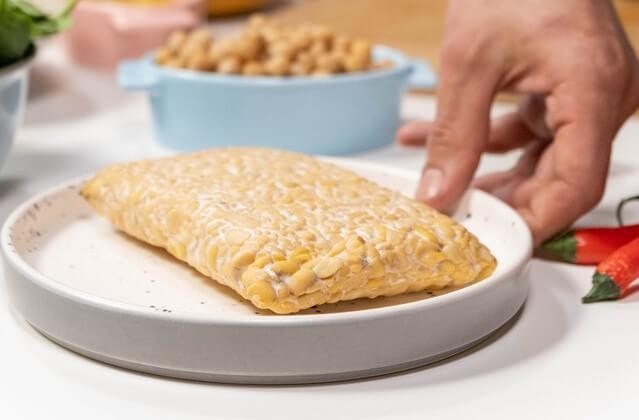
Next in line when it comes to high protein plant-based food sources, is tempeh. Even if you’re new to plant-based eating, odds are you’ve probably heard about it at some point.
Unlike seitan which is made from wheat gluten, tempeh is made from cooked and fermented soybeans.
And while it doesn’t exactly have that “meaty” look that seitan has, it sure has an interesting nutritional profile that makes it attractive to vegans and meat-eaters alike.
But first thing first, the protein content.
- A 100g serving of tempeh packs as much as 20g of protein, and a one-cup serving (166g) contains about 32g.
Tempeh is also pretty rich in fiber and probiotics which promote proper digestion and a healthy gut.
While soybeans is the primary ingredient that goes into making tempeh, other supplementary ingredients may be added to further boost the nutritional content.
Soy-based products are great for people who are sensitive to gluten, and can’t eat things like seitan or other gluten-rich foods.
When it comes to cooking, tempeh certainly delivers. It blends well in most foods, and makes a great meat substitute in a large number of dishes. In some cases, it is even used as a vegan substitute for bacon, A.K.A “tempeh bacon”.
While you can certainly go through the long process of making your own tempeh at home, you can also easily get it in most stores today as well.
3) Tofu
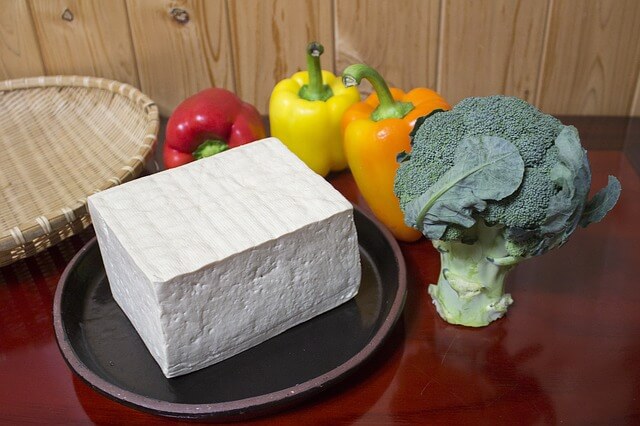
Similar to its equally popular brother tempeh, Tofu is another soy-based food product that can serve as a great high-protein meat substitute for vegans and vegetarians.
Tofu is basically made from processed and coagulated soy milk, which is then pressed into the cubes you’re used to seeing. The process is kind of similar to how cheese is made.
Depending on the water content and how hard it is pressed, you can have certain variations like firm and extra firm tofu, to less harder variations like silken tofu.
When it comes to protein content, tofu doesn’t lag too far behind its brother.
- A 100g serving, especially the firm types, can pack as much as 18g protein
In addition to its high protein content, tofu is also known for its low carb content.
It packs just about 5g of net carbs per 100g serving, which makes it a great choice for people watching their carb intake as well.
While there is some level of debate over the amount and kind, of processing that goes into soy products like tofu and tempeh, it is still very possible (and often advised) to go after the minimally processed and organic versions when shopping.
When it comes to cooking, tofu is just as versatile.
From things like tofu scramble, which is a vegan substitute for scrambled eggs, to serving as a great meat substitute and more, tofu is a great plant-based protein source worth adding to your plate.
4) Edamame
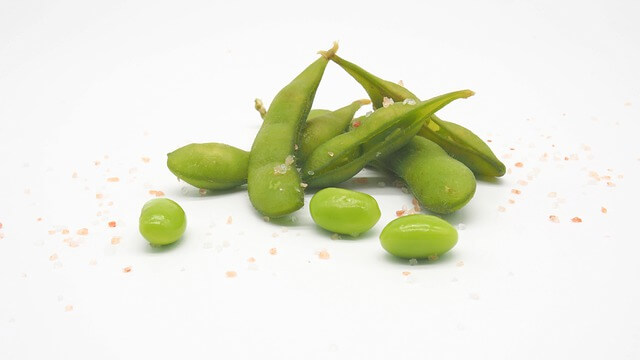
While the other food products listed before now involve some level of artificial processing in order to achieve them, edamame is a more natural protein-food source.
They are basically young and unripe soybeans, which are naturally low in calories, and high in protein, fiber and other important nutrients.
- A 100g serving of edamame contains about 120 calories, 5g of fiber, and about 12g of protein. (18g of protein per cup)
One interesting thing about edamame is that it actually contains all the essential amino acids your body requires, unlike most of the other plant proteins which need to be supplemented.
They’re also rich in other nutrients, such as fiber (as stated above), vitamins K, folate, minerals like Magnesium and copper, and much more. They’re indeed a nutritional powerhouse.
In addition to being served as a popular snack in Asian-type restaurants, edamame can also be enjoyed in a variety of other main dishes like stir-fry, soups and stews, salads and more.
They are indeed a wonderful plant-based protein source for everyone, except of course, for people with soy allergies or sensitivities.
5) Lentils
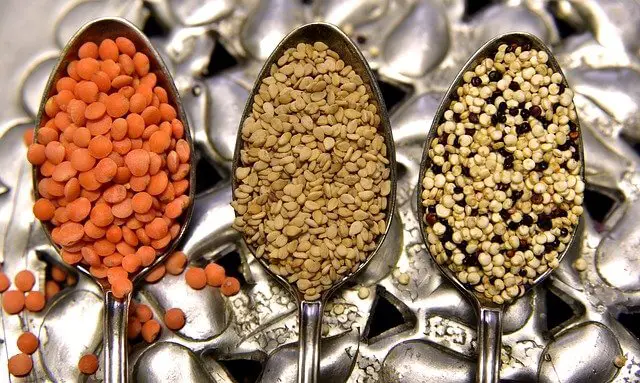
Moving on to other members of the legume family, we have lentils. They’re pretty nutritious and healthy, and can also serve as a great source of protein on vegetarian meatless diets.
Lentils come in a variety of different colors, ranging from brown, which is the most popular, to other ones like green, red, yellow and so on.
When it comes to nutrition, lentils certainly deliver. They’re rich in a good number of nutrients and minerals, and also pack a good protein content as well.
- A 100g serving of lentils can pack as much as 9g of protein (about 17-18g per cup)
When it comes to cooking, they’re pretty easy to use, and seem to cook pretty quickly overall. They’ll certainly make those weeknight dinners a whole lot easier and stress-free.
6) Chickpeas
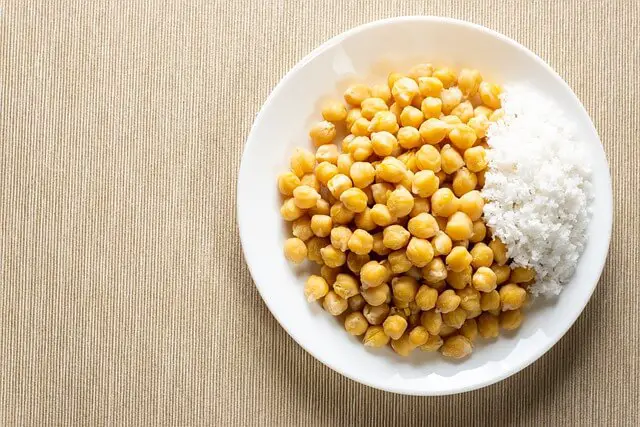
Another amazing member of the legume family you want to be adding to your plate are chickpeas. They’re a decent source of protein, fiber and other important nutrients as well.
While there are a couple variations of chickpeas, the most popular type is the light brown one, popularly known as garbanzo beans, and is what you’ll find in most stores today.
When it comes to their protein content, they fall slightly behind lentils and still pack a decent amount.
- A 100g serving of dried chickpeas packs about 8.8g of protein (16g per cup), as well as a decent 7g of fiber, and about 146 calories
Like many of the other healthy foods listed here, chickpeas can provide an array of interesting health benefits, from aiding weight management, to promoting proper digestion, supporting heart health and more.
And while they don’t exactly contain all the essential amino acids to make a complete protein, they contain pretty much most of them, with the exception of only a few, which can easily be gotten from other foods.
They are also just as versatile when it comes to cooking, and you’ll find them in an array of dishes, from salads, to homemade burgers, to falafel and more.
7) Peanuts
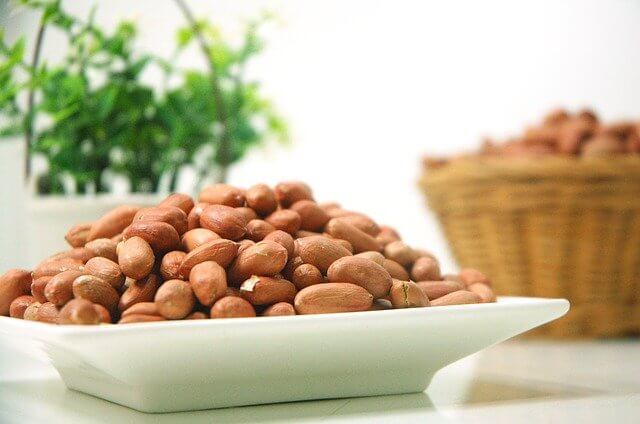
Although they have the word “nut” in their name and are usually referred to as a type of nut, it would interest you to know that peanuts are actually classified as a legume.
Regardless of how you choose to classify them (I’ll personally still call them nuts btw), they are without a doubt, a great addition to any diet.
While peanuts are loved for their absolutely yummy taste, they are considered a superfood, since they pack a good number of nutrients and minerals, and offer a range of interesting benefits.
When it comes to how much protein you’re getting, you certainly won’t be disappointed.
- A 100g serving of peanuts packs as much as 25g of protein, which translates to about 38g per cup, and 7.4g per ounce.
They’re also low in carbs, high in healthy fats, and rich in good nutrients like biotin, vitamin E, B vitamins and much more.
While they can be enjoyed raw as a snack, they also have their way in a good number of dishes, including salads, in certain sauces, desserts and more.
Apart from people with peanut allergies and a few other related conditions, most people can enjoy peanuts freely, regardless of the type of diet you’re on.
8) Almonds
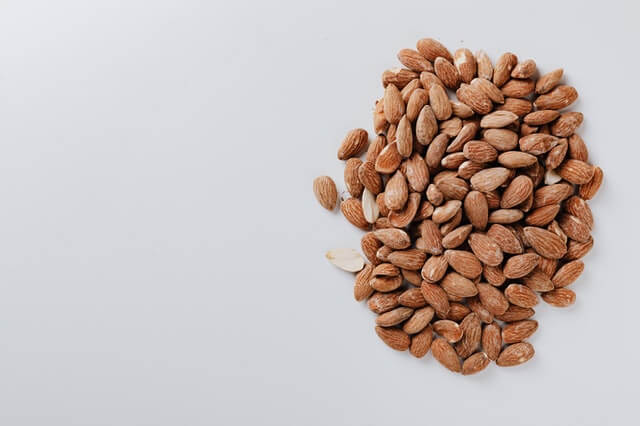
Most nuts in general are usually nutrient-dense, low in carbs, and relatively high in healthy fats, fiber and protein.
And when listing out some of the best nuts you can enjoy, you certainly can’t leave out almonds. From their impressive nutritional profile and potential health benefits to their versatility in the kitchen, there’s no reason not to include these lovelies in your diet.
Let’s take a quick look at what they offer.
- A 100g serving of almonds packs as much as 21g of protein (about 6g per ounce) and about 22g of carbohydrates (13 of which is fiber)
And that’s not to mention the other important nutrients it contains, such as calcium, iron, certain B vitamins, magnesium, potassium and much more.
Another thing that makes almonds so lovable, is how versatile they are when it comes to the kitchen.
They can be used to make things like almond milk, which is a great substitute to regular dairy milk, almond flour, which is a wonderful low carb baking alternative, and much more.
Almonds, depending on the form, can be enjoyed alone as a snack, or as part of a main dish or even dessert. They are certainly worth adding to your plate.
9) Pumpkin seeds
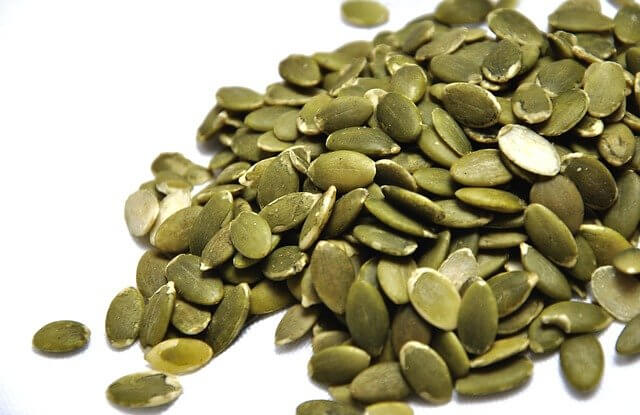
Don’t mind their tiny size. Seeds, just like nuts are nutritional powerhouses as well, and can make a great addition to any diet. Similar to nuts, most seeds are also relatively low in carbs, and high in fats and protein too.
Take pumpkin seeds for example. Popularly enjoyed as a snack, they have an interesting nutritional profile that makes them a great fit, especially for people on plant-based diets.
- A 100g serving of pumpkin seeds without shells, contains about 30g of protein (8.5 per ounce)
They’re also low in carbs, high in healthy fats and a great source of important vitamins and minerals. A one ounce serving packs a nice 14g of fat, and about 2.4g net carbs, which is great for people on low carb type diets.
Pumpkin seeds can be enjoyed plainly as a snack, used as yummy toppings, or paired with other ingredients to create a delicious and nutritious meal.
10) Quinoa
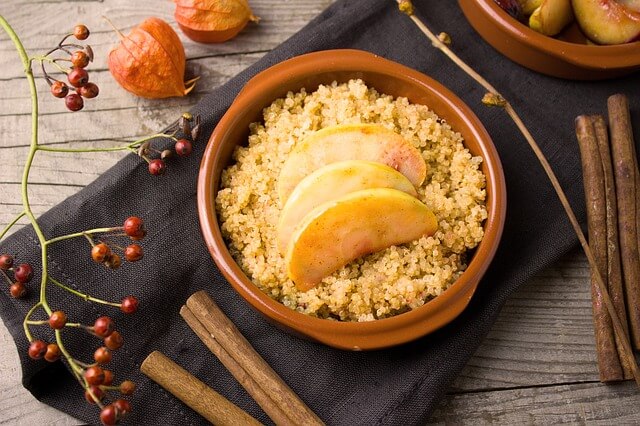
Legumes, nuts and seeds aren’t the only plant-based foods that can pack a lot of protein. Certain grains too, like quinoa can serve as a good protein source for people on vegetarian and vegan diets.
Known for its fluffy tenderness and nutritional goodness among other things, quinoa is one of the best grains you can add to your plate.
And while there are several varieties of quinoa, the most common versions seem to be the white, red and black, and sometimes a mix of all three of them.
Let’s take a look at how much protein you’re getting.
- A 100g serving of cooked quinoa packs about 4.4g of protein (8.1g per cup)
In addition to this, quinoa is also a great source of important nutrients, and antioxidants, which all offer a load of interesting health benefits, from fighting inflammation, to aiding weight loss, supporting a healthy gut, and much more.
Another big plus with quinoa when it comes to protein, is that it contains all the essential amino acids your body requires, unlike some other plant-based protein sources that lack a couple here and there.
They’re also naturally gluten-free and can go well in a large variety of dishes. You certainly won’t regret adding them to your plate.